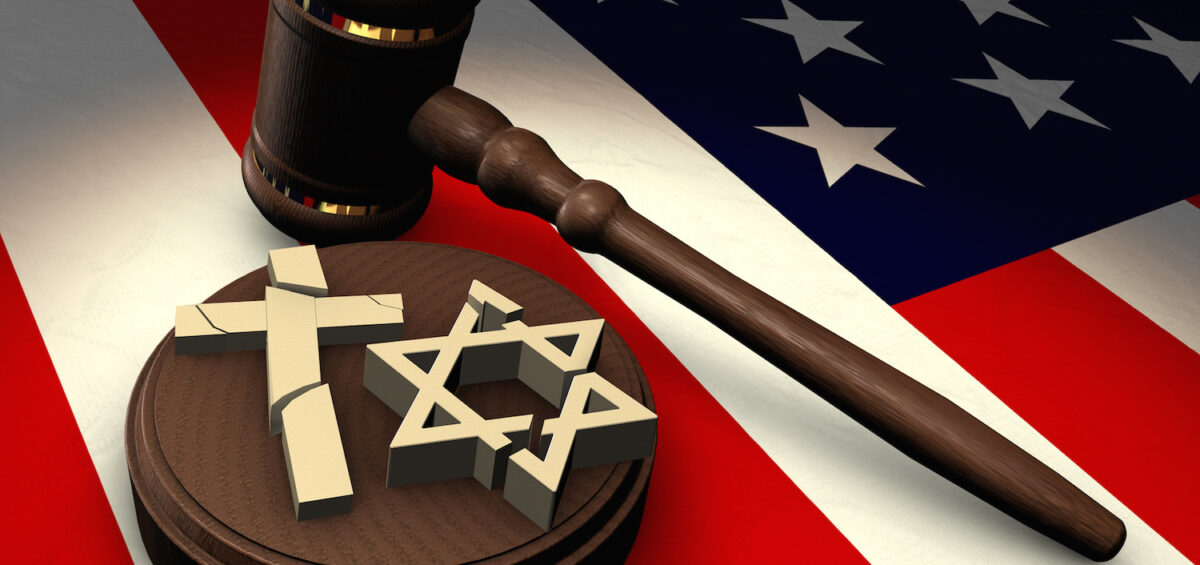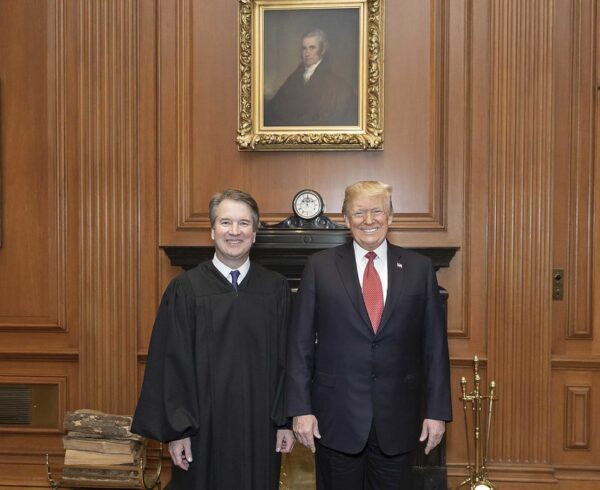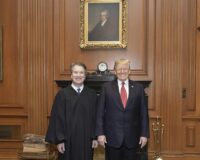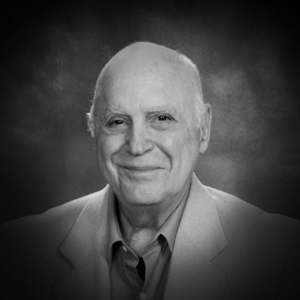Judeo-Christians inescapably find themselves in the midst of a political process when they state their overarching goal from Philippians 2:10 (Every knee shall bow and every tongue confess that Jesus Christ is Lord of all) and embark upon the Great Commission (Go therefore and make disciples of all nations, baptizing them in the name of the Father and of the Son and of the Holy Spirit, teaching them to observe all that I have commanded you) to bring this goal to reality. The 2016 national campaign sharpens the focus onto these politics: What tactics will Judeo-Christians utilize in the political arena to ensure our freedom to pursue the goal? How will we evaluate and choose the best candidates, especially for President of the United States (POTUS) so that we can get on with our work?
Religious Politics
Judeo-Christians should vigorously support the Free Exercise and Establishment Clauses within the First Amendment of the US Constitution: Congress shall make no law respecting an establishment of religion, or prohibiting the free exercise thereof… Basically, these clauses—when properly applied and enforced—establish a level playing field under the Constitution and within the political arena for all religions in this country. These clauses, among other benefits, have protected this country from the internecine religious wars and church/state hostilities that plague many other countries. The Constitutional Framers were well aware of the pernicious effects of these hostilities in Europe at the time of the American Revolution.
Yes, I freely admit that Judeo-Christians were massively involved in the American Revolution that freed us not only from authoritarian rule by England’s kings but also from church/state conflicts, at least in principle. I further admit that several of the Framers who produced the Constitution were Judeo-Christians and, in some instances, evangelistic in religious orientation. Nevertheless, the Constitution is a neutral document with respect to religion and this country is not a theocracy. Attempts to maintain the Constitution as a Judeo-Christian document belie the plain words of the Constitution and the historical record leading to its development.
Under the Constitution, Judeo-Christians are free to pursue their goals through, in part, the political arena. Judeo-Christians, if they believe the thrust of Holy Scripture, should understand they need nothing more than a religiously level playing field to prevail in the free marketplace in which all religions compete in the United States.
I suspect most Judeo-Christians agree with the primary goal and with the Great Commission. That is, we generally have agreement on our objective and strategy. Our most serious disagreements arise from the tactics we advocate—especially in the political arena—that should be employed to implement the strategy to take us to our goal. This disagreement brings us face-to-face with the destructive advocacy of Dominionism within the political arena.
Dominionism
According to rationalwiki.org, Genesis 1:26 of the King James Version of the Bible provides the foundational support for Dominionism: And God said, Let us make man in our image, after our likeness: and let them have dominion over the earth, and over every creeping thing that creepeth upon the earth. This support should be discounted because: (1) In every other verse of the King James Version where dominion appears, the word refers either to God’s dominion over the world and all people or to the dominion of a king over his kingdom and (2) The original word for dominion is more accurately translated as stewardship.
Dominionists generally believe: (1) The United States should be Christian theocracy; (2) The civil laws of the Old Testament—as distinct from the moral laws such as the Ten Commandments—should be enforced by reforming the US legal system along theocratic lines, which would entail a substantial increase in the use of capital punishment; and (3) The Biblical injunctions allowing slavery should be followed.
We should not regard Dominionism as simply an outgrowth of literal interpretations of Holy Scripture. Most Judeo-Christian theologians, from the beginnings of Christianity, have rejected the foundational premise of Dominionism. The Mosaic Law can be divided into three categories: the moral law (e.g., the Ten Commandments), the civil law (the “constitution” of ancient Israel), and the ceremonial law (e.g., the injunctions against eating pork). Traditionally, the coming and resurrection of Jesus nullified the ceremonial and civil laws. Furthermore, the very early Council of Jerusalem (Acts 15) under the influence of St. Paul ruled that only certain moral aspects of the law applied to gentile Christians. St. Paul argued extensively and with great theological vigor that the whole point of the law was to lead the Jews to Jesus. This purpose was fulfilled; therefore, the law is no longer in effect. In summary, therefore, Dominionism should not be considered a Judeo-Christian doctrine, much less a political theory Judeo-Christians should support.
Despite these objections, Dominionism has a seductive appeal to some Judeo-Christians: The goal of Dominionism—conversion of the United States to a legal theocracy—bears a superficial resemblance to the goal of Judeo-Christianity stated above—Every knee shall bow and every tongue confess that Jesus Christ is Lord of all. The salient difference arises from the Dominionism goal to institute Old Testament laws through the US legal system, as opposed to the Judeo-Christian goal that would be instituted by changes in hearts and minds. Hearts and minds would be changed by tactics more effective than the legal system: profession, proclamation, witness, and service. These tactics converted the Roman Empire to Christianity without any support, and often in the face of fierce opposition, from the Empire’s legal system.
The Dominionist Candidate?
According to an article (“Ted Cruz’s Campaign is Fueled by a Dominionist Vision for America”) that John Fee authored for the 04 Feb 2016 edition of Religion News Service at religionnews.com), Senator Ted Cruz is at least a closet Dominionist. Sen. Cruz often references the important role that his father, traveling evangelist Rafael Cruz, has played in the senator’s life. Rafael Cruz, in a 2012 sermon at the New Beginnings Church in Bedford, Texas, described Sen. Cruz’ political campaign as a direct fulfillment of biblical prophecy. An important facet of this prophecy states that God will anoint Christian “kings” to transfer wealth from the wicked to the righteous.
Rev. Larry Huch, the pastor of New Beginnings Church, claimed that Sen. Cruz is one of these kings, anointed by God to help Christians “go to the marketplace and occupy the land . . . and take dominion” over it. The transfer of wealth will relieve Christians of all financial woes, thereby allowing true believers to gain political and cultural power, through which they will build or rebuild the United States as a Christian nation. Once the United States becomes in reality a Dominionist Christian nation, Jesus will return.
Sen. Cruz is a good lawyer and politician. I suspect he is well aware that his affirmation of, and support for, Dominionism as expressed by his father will be too much for many US voters to accept: Sen. Cruz has never invoked this aberrant theology in the public forums of his campaign. Under our Constitution, Sen. Cruz has every right to be a Dominionist. He also has the Constitutional right to work toward changing the United States into a Dominionist nation, a legal theocracy—provided he does not call for, or engage in, violence to effect this change. Similarly, his political opponents have the same rights to oppose institution of Dominionist theology upon our democratic republic.
Many citizens will oppose converting the United States to a Dominionist nation under the Old Testament legal system. For example, do we really want—under our laws—to execute non-virgin brides, husbands and wives who engage in sexual relations during the wives’ menstrual periods, disobedient children, and homosexuals? Accordingly, our media and Sen. Cruz’ debate opponents should probe him about his Dominionist beliefs and political goals. The American public should not accept typical lawyer and politician dissembling.
Sen. Cruz should be presented with the opportunity to state without prevarication: Are you a Dominionist and will you work, if elected to the Presidency, to convert the United States to a Dominionist-inspired theocracy? Forthcoming debates and media appearances would be excellent platforms for Sen. Cruz to be questioned. If Sen. Cruz does not provide unequivocal answers, we will know as much about him as if he were to give clear and forthright answers.
A sufficient number of voters may agree with Dominionist theology to elect Sen. Cruz as POTUS. Voters, however, should know before the election what Sen. Cruz believes and advocates.










